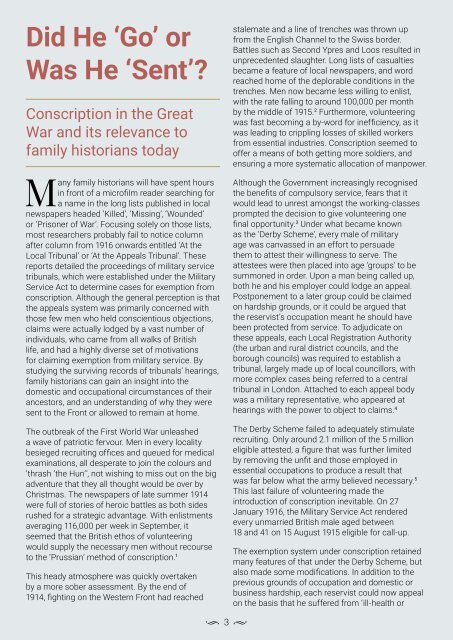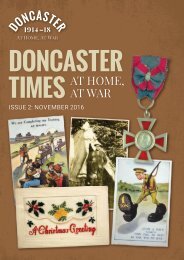Doncaster Times Issue 1 - June 2016
Doncaster Times is a biannual publication of articles and pieces researched and written by members of the public, volunteers and professionals. For its first four years, the magazine will feature articles about Doncaster during the First World War, to commemorate the centenary. The most recent publication is available in hard copy only, available to purchase from Doncaster Museum and Art Gallery, Doncaster Central Library and the Tourist Information Centre.
Doncaster Times is a biannual publication of articles and pieces researched and written by members of the public, volunteers and professionals. For its first four years, the magazine will feature articles about Doncaster during the First World War, to commemorate the centenary. The most recent publication is available in hard copy only, available to purchase from Doncaster Museum and Art Gallery, Doncaster Central Library and the Tourist Information Centre.
You also want an ePaper? Increase the reach of your titles
YUMPU automatically turns print PDFs into web optimized ePapers that Google loves.
Did He ‘Go’ or<br />
Was He ‘Sent’?<br />
Conscription in the Great<br />
War and its relevance to<br />
family historians today<br />
Many family historians will have spent hours<br />
in front of a microfilm reader searching for<br />
a name in the long lists published in local<br />
newspapers headed ‘Killed’, ‘Missing’, ‘Wounded’<br />
or ‘Prisoner of War’. Focusing solely on those lists,<br />
most researchers probably fail to notice column<br />
after column from 1916 onwards entitled ‘At the<br />
Local Tribunal’ or ‘At the Appeals Tribunal’. These<br />
reports detailed the proceedings of military service<br />
tribunals, which were established under the Military<br />
Service Act to determine cases for exemption from<br />
conscription. Although the general perception is that<br />
the appeals system was primarily concerned with<br />
those few men who held conscientious objections,<br />
claims were actually lodged by a vast number of<br />
individuals, who came from all walks of British<br />
life, and had a highly diverse set of motivations<br />
for claiming exemption from military service. By<br />
studying the surviving records of tribunals’ hearings,<br />
family historians can gain an insight into the<br />
domestic and occupational circumstances of their<br />
ancestors, and an understanding of why they were<br />
sent to the Front or allowed to remain at home.<br />
The outbreak of the First World War unleashed<br />
a wave of patriotic fervour. Men in every locality<br />
besieged recruiting offices and queued for medical<br />
examinations, all desperate to join the colours and<br />
‘thrash ‘the Hun’’, not wishing to miss out on the big<br />
adventure that they all thought would be over by<br />
Christmas. The newspapers of late summer 1914<br />
were full of stories of heroic battles as both sides<br />
rushed for a strategic advantage. With enlistments<br />
averaging 116,000 per week in September, it<br />
seemed that the British ethos of volunteering<br />
would supply the necessary men without recourse<br />
to the ‘Prussian’ method of conscription. 1<br />
This heady atmosphere was quickly overtaken<br />
by a more sober assessment. By the end of<br />
1914, fighting on the Western Front had reached<br />
stalemate and a line of trenches was thrown up<br />
from the English Channel to the Swiss border.<br />
Battles such as Second Ypres and Loos resulted in<br />
unprecedented slaughter. Long lists of casualties<br />
became a feature of local newspapers, and word<br />
reached home of the deplorable conditions in the<br />
trenches. Men now became less willing to enlist,<br />
with the rate falling to around 100,000 per month<br />
by the middle of 1915. 2 Furthermore, volunteering<br />
was fast becoming a by-word for inefficiency, as it<br />
was leading to crippling losses of skilled workers<br />
from essential industries. Conscription seemed to<br />
offer a means of both getting more soldiers, and<br />
ensuring a more systematic allocation of manpower.<br />
Although the Government increasingly recognised<br />
the benefits of compulsory service, fears that it<br />
would lead to unrest amongst the working-classes<br />
prompted the decision to give volunteering one<br />
final opportunity. 3 Under what became known<br />
as the ‘Derby Scheme’, every male of military<br />
age was canvassed in an effort to persuade<br />
them to attest their willingness to serve. The<br />
attestees were then placed into age ‘groups’ to be<br />
summoned in order. Upon a man being called up,<br />
both he and his employer could lodge an appeal.<br />
Postponement to a later group could be claimed<br />
on hardship grounds, or it could be argued that<br />
the reservist’s occupation meant he should have<br />
been protected from service. To adjudicate on<br />
these appeals, each Local Registration Authority<br />
(the urban and rural district councils, and the<br />
borough councils) was required to establish a<br />
tribunal, largely made up of local councillors, with<br />
more complex cases being referred to a central<br />
tribunal in London. Attached to each appeal body<br />
was a military representative, who appeared at<br />
hearings with the power to object to claims. 4<br />
The Derby Scheme failed to adequately stimulate<br />
recruiting. Only around 2.1 million of the 5 million<br />
eligible attested, a figure that was further limited<br />
by removing the unfit and those employed in<br />
essential occupations to produce a result that<br />
was far below what the army believed necessary. 5<br />
This last failure of volunteering made the<br />
introduction of conscription inevitable. On 27<br />
January 1916, the Military Service Act rendered<br />
every unmarried British male aged between<br />
18 and 41 on 15 August 1915 eligible for call-up.<br />
The exemption system under conscription retained<br />
many features of that under the Derby Scheme, but<br />
also made some modifications. In addition to the<br />
previous grounds of occupation and domestic or<br />
business hardship, each reservist could now appeal<br />
on the basis that he suffered from ‘ill-health or<br />
•<br />
3 •




